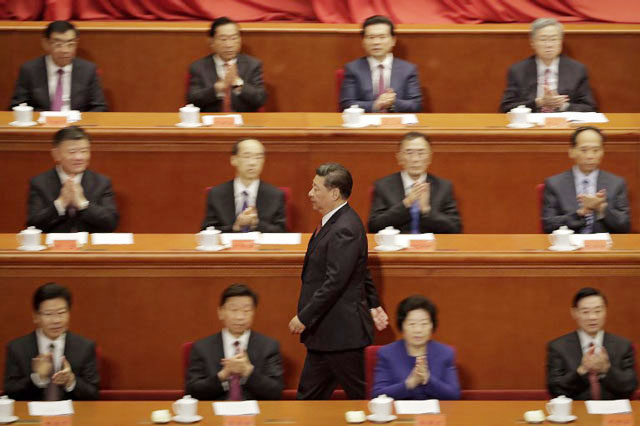
Beijing, China | AFP | The Chinese Communist Party’s leadership has called for the removal of presidential term limits, opening the door for China’s most powerful leader in decades, Xi Jinping, to remain in office beyond 2023.
The party’s Central Committee has proposed deleting from the constitution the stipulation that a president “shall serve no more than two consecutive terms” of five years, the official Xinhua news agency said Sunday.
Xi, who is also party chief and seen as the most powerful ruler since Mao Zedong, has been president since 2013 and the 64-year-old leader would have to step down in 2023 under the current system.
The proposed change, which would also apply to the vice-president, will be submitted to legislators at the annual full session of the National People’s Congress starting March 5.
Xi has been chipping away at the collective model of leadership that was promoted by Deng Xiaoping, the architect of the country’ economic reforms in the 1980s.
Xi’s two predecessors, Jiang Zemin and Hu Jintao, both served two five-year terms, but he has signalled that he has bigger ambitions.
– Name in constitution –
At the 19th five-yearly party congress last October, the party unveiled a new seven-member Standing Committee — its top ruling body — that lacked any clear heir apparent to Xi.
Xi also saw his eponymous political philosophy — Xi Jinping Thought on Socialism with Chinese Characteristics for a New Era — included in the party’s charter, an honour only accorded to one previous leader, Mao, during his lifetime.
The Central Committee also proposed adding Xi’s “thought” to the national constitution, joining Mao again.
Since taking over as party general secretary in late 2012, Xi has waged a remorseless battle against corruption, which has seen more than one million people punished. Some see the campaign also as a means for him to eradicate internal opposition.
A major outcome of the 19th Party Congress was the decision to establish a new anti-graft agency, the National Supervisory Commission, that will coordinate investigations at all levels of government and expand its remit to include non-party members.
The Central Committee proposed listing the commission as a new state organ in the constitution.
Xi is keeping a key ally by his side as he cements power.
The feared former head of the anti-graft agency, Wang Qishan, stepped down from the Standing Committee last October because at 69, he had reached the traditional retiring age.
But Wang was selected earlier this year as a deputy to the upcoming National People’s Congress annual session, fuelling speculation that he could become Xi’s vice-president or gain another influential role.
Xi’s presidency has been marked by the return of a personality cult and a major crackdown on democracy and human rights.
Earlier this year, the party mouthpiece People’s Daily further cemented his elevation by publishing an article that for the first time referred to him as “lingxiu” — a Mao-era honorific with more reverential and spiritual connotations than the ordinary terms.
 The Independent Uganda: You get the Truth we Pay the Price
The Independent Uganda: You get the Truth we Pay the Price


